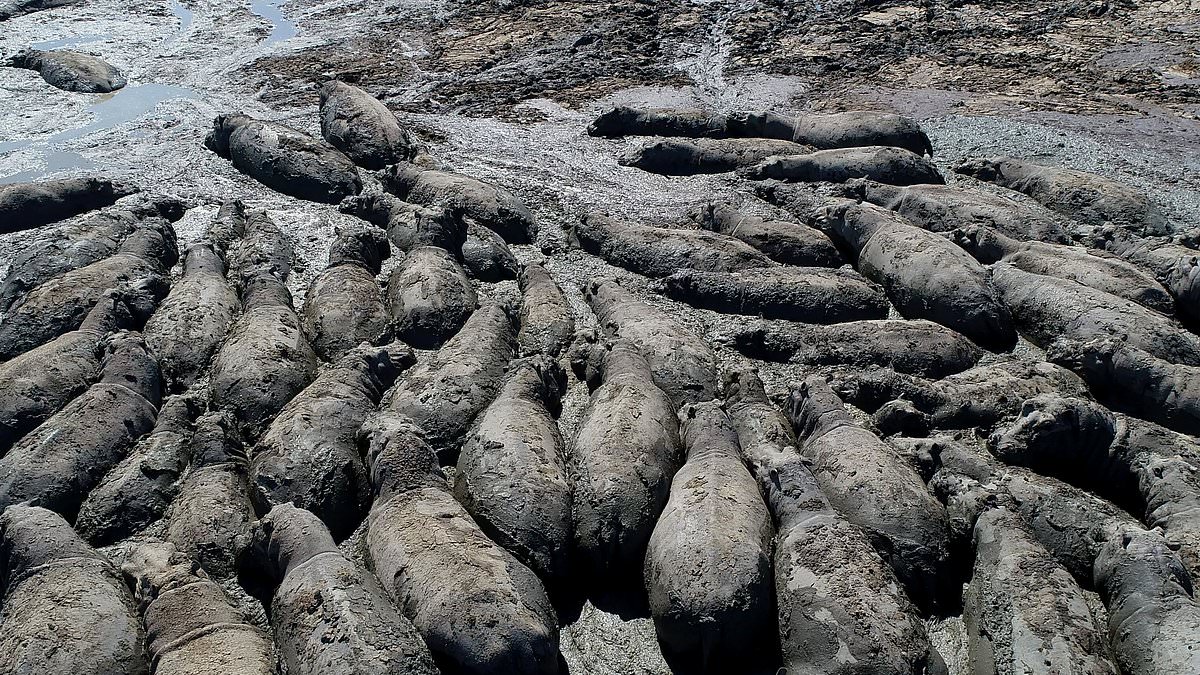- Southern Africa has been devastated by a persistent drought that began in October 2023 in Botswana.
Endangered hippo herds are facing death in Botswana’s tropical heat, left stranded in drying ponds and unable to move as drought ravages the southern African country.
The harrowing scenes show clusters of animals huddled together in the mud as they desperately try to cool off and avoid sunburn, as temperatures rise and moisture evaporates from the ground.
While seasonal floods normally make the Okavango Delta a verdant habitat for wildlife, the dried-up Thamalakane River has forced herds of hippos to head for natural water reserves near the tourist town of Maun or risk a slow and painful death. Caused by dehydration and heat stroke.
Botswana is home to one of the world’s largest populations of hippos living in the wild, estimated by the International Union for Conservation of Nature (IUCN) at between 2,000 and 4,000.
“River vegetation is poor and hippos in Gamiland (North West Region) are dependent on water flowing through the Okavango Delta systems,” said Lesigo Muzeki, spokesperson for the Department of Wildlife and National Parks (DWNP) in Gaborone, the capital of Botswana. it depends.
He said they were still investigating how many hippos had died in the pools.
Hippos have thick but sensitive skin, which means they need regular bathing to prevent sunburn, and they usually live in humid areas.
Without water, they can become aggressive and approach villages.
Local authorities are calling for hippos to be moved to protected areas to avoid conflict with humans.
Southern Africa has been hit by severe drought in recent months, caused by the El Nino weather phenomenon, which has threatened harvests and left millions of people hungry.
El Nino is a natural weather pattern that is usually associated with increased heat around the world, leading to drought in some parts of the world and heavy rains in others.
Several countries in the region have recently declared a state of national disaster, and the United Nations estimates that some 20 million people in the south face “acute hunger.”
Malawi, Zambia and Zimbabwe are among those warning of disaster and the potential danger of living with a drought that will wipe out livestock and cause the price of staple crops to rise dramatically.
In February, Zimbabwe, Zambia, Malawi, Angola, Mozambique and Botswana received only a fifth of the rainfall they would normally expect.
Thousands of cattle have died in Malawi after walking through fields still muddy from last year’s rains and getting stuck, according to the aid organization CARE.
According to the Intergovernmental Panel on Climate Change, temperatures in southern Africa have also increased by between 1.04 and 1.8 degrees Celsius over the past 50 years, creating an “extreme” climate change “hotspot”.
According to the European Commission report, the drought in Botswana started in October 2023.
It then spread to Angola, Zambia, Zimbabwe and Namibia, and today it affects most of southern Africa.
Botswana alone lost at least 300 elephants in mysterious circumstances last year, according to Grace Mozilla, the permanent secretary at the Ministry of Environment and Tourism, who is reflecting on the devastation caused by the drought.
“Wild animals get stuck in the mud and desperately search for water and die. It’s a harrowing experience,” he said.
South Africa’s human population has also been affected by reduced access to food and water, reporting tragic losses.
Francesca Erdelman, WFP country director for Zimbabwe, said last year’s harvest was bad, but this season is even worse. “This is not a normal situation,” he said.
Joseph Nelia, a 77-year-old traditional leader in Mangwe, Zimbabwe, said he could not remember ever being so hot, so dry and so desperate.
The dams have no water, the riverbeds are dry and there are few boreholes. We used to rely on wild fruits, but they are also dried.
Since then, the US aid agency, USAID, has stepped in with life-saving aid to help the region.
About 9 million people, half of them children, still need help in Malawi.
More than 6 million people in Zambia, 3 million of whom are children, are affected by the drought, UNICEF said.
This is almost half the population of Malawi and 30% of the population of Zambia.
“Extreme weather is expected to become more common in East and Southern Africa in the coming years,” said UNICEF Regional Director Eva Kadili.
By eliminating this year’s harvest, millions of people in Zimbabwe, southern Malawi, Mozambique and Madagascar will not be able to feed well by 2025.
USAID’s Famine Early Warning System estimates that 20 million people in southern Africa will need food assistance in the first few months of 2024.
Many will not receive the aid, as aid agencies also have limited resources amid the global hunger crisis and humanitarian budget cuts by governments.
#Herds #hippos #trapped #drying #ponds #drought #Botswana
